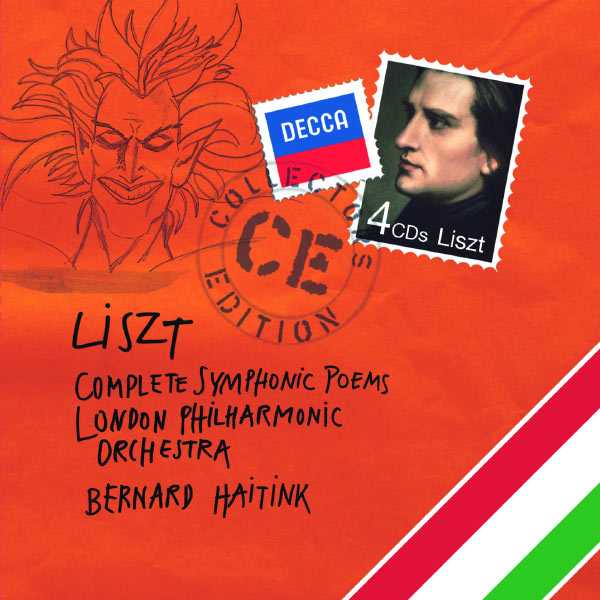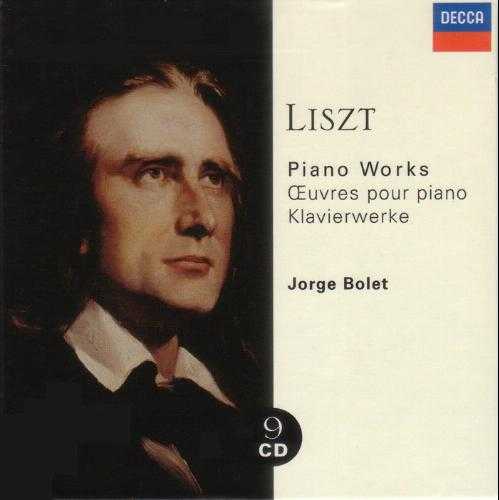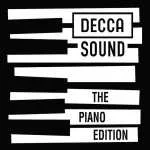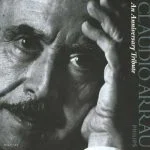
Composer: Ferencz Liszt
Orchestra: London Philharmonic Orchestra
Conductor: Bernard Haitink
Number of Discs: 4
Format: FLAC (tracks)
Label: Decca
Catalogue: 4782309
Release: 2010
Size: 1.15 GB
Recovery: +3%
Scan: yes
CD 01
01. Ce qu’on entend sur la montagne, symphonic poem No. 1, S.95 (after Victor Hugo)
02. Tasso, Lamento e trionfo, symphonic poem No. 2, S.96 (after Byron)
03. Les Préludes, symphonic poem No. 3, S.97 (after Lamartine)
CD 02
01. Orpheus, Symphonic Poem No. 4, S.98
02. Prometheus, Symphonic Poem No. 5, S.99
03. Mazeppa, Symphonic Poem No. 6, S.100
04. Festklänge, symphonic poem No. 7, S.101
CD 03
01. Héroïde funèbre, symphonic poem No. 8, S.102
02. Hungaria, symphonic poem No. 9 S. 103
03. Hamlet, Symphonic Poem No. 10, S.104
CD 04
01. Hunnenschlacht, symphonic poem No. 11, S.105
02. Die Ideale, symphonic poem No. 12, S. 106 (after Schiller)
03. Von der Wiege bis zum Grabe, symphonic poem No. 13, S.107
04. Mephisto Waltz No. 1, S. 110 No. 2 “The Dance in the Village Inn” (after Lenau)
At one point back in the days of LPs it seemed that conductor Bernard Haitink was waging an Ormandy-like campaign to record all of the Western orchestral literature for Philips. Moreover, for many listeners this was a welcome pursuit because Haitink was so good at so many things; his 1973 recording of Stravinsky’s Le Sacre du printemps is still considered one of the most superlative readings of the work, even though Haitink’s catalog ultimately grew to the extent that it became difficult to single out what was best within it. One of his signature achievements, however, was his complete recording of the symphonic poems of Franz Liszt; Haitink was the first conductor to record all 10 of these works and likewise first to record in stereo the earliest symphonic poem in the cycle Ce qu’on entend sur la montagne (1848-1854). Initially issued as single LPs in 1972 as a five-LP box set, Haitink’s cycle made its digital debut as two separate CDs as Philips’ Duos; economical, but in generic packages that would hardly stand out from the crowd. Decca’s four-disc box, Liszt: Complete Symphonic Poems is a huge improvement over the Philips Duos; it has an attractive design, some freshly written liner notes that are brief but serviceable, and even at full-price it costs only two-thirds of what buying both Philips Duos costs in order to get the complete set.
At the time Haitink was undertaking this cycle, the jury was still out on the relative value of Liszt’s orchestral music, though Les Preludes and Mephisto Waltz No. 1 — both included on this set — had always remained popular favorites; just a decade before, Leonard Bernstein had gotten the ball rolling through recording the Faust symphony for CBS; it would not be long before Herbert von Karajan discovered Tasso, Lamento e Trionfo to his liking. By the 21st century, all of Liszt’s symphonic poems are regarded as major romantic orchestral literature and each of the 10 has something unique to offer, even if we do not remember Mazeppa or Die Ideale as readily as we do Les Preludes. The Haitink cycle of Liszt’s symphonic poems, recorded between 1968 and 1972, was considered state-of-the-art in terms of recording quality back then and still sound terrific on CD. If one is familiar with romantic orchestral literature such as Brahms, Berlioz, or Tchaikovsky, then Liszt’s symphonic poems will be a revelation to you; they stand halfway between French and German traditions, and this package from Decca is certainly one of the best available in a qualitative sense, and the asking price is certainly modest.




The first two tracks are clipped at the end. There is at least one other I found clipped at the very end. Just to let you know. Thanks!
Thanks for your attention. I’ve checked: this is the original digital copy so I can do nothing with it